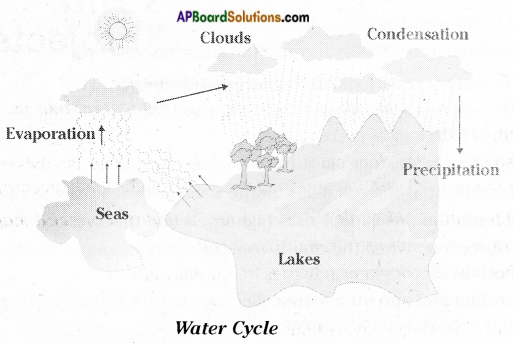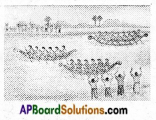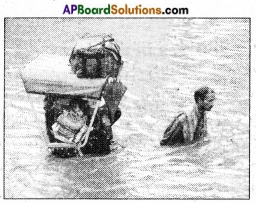 |
| AP Board Class 6 Science Chapter 4 Water Textbook Solutions PDF: Download Andhra Pradesh Board STD 6th Science Chapter 4 Water Book Answers |
Andhra Pradesh Board Class 6th Science Chapter 4 Water Textbooks Solutions PDF
Andhra Pradesh State Board STD 6th Science Chapter 4 Water Books Solutions with Answers are prepared and published by the Andhra Pradesh Board Publishers. It is an autonomous organization to advise and assist qualitative improvements in school education. If you are in search of AP Board Class 6th Science Chapter 4 Water Books Answers Solutions, then you are in the right place. Here is a complete hub of Andhra Pradesh State Board Class 6th Science Chapter 4 Water solutions that are available here for free PDF downloads to help students for their adequate preparation. You can find all the subjects of Andhra Pradesh Board STD 6th Science Chapter 4 Water Textbooks. These Andhra Pradesh State Board Class 6th Science Chapter 4 Water Textbooks Solutions English PDF will be helpful for effective education, and a maximum number of questions in exams are chosen from Andhra Pradesh Board.Andhra Pradesh State Board Class 6th Science Chapter 4 Water Books Solutions
| Board | AP Board |
| Materials | Textbook Solutions/Guide |
| Format | DOC/PDF |
| Class | 6th |
| Subject | Science |
| Chapters | Science Chapter 4 Water |
| Provider | Hsslive |
How to download Andhra Pradesh Board Class 6th Science Chapter 4 Water Textbook Solutions Answers PDF Online?
- Visit our website - Hsslive
- Click on the Andhra Pradesh Board Class 6th Science Chapter 4 Water Answers.
- Look for your Andhra Pradesh Board STD 6th Science Chapter 4 Water Textbooks PDF.
- Now download or read the Andhra Pradesh Board Class 6th Science Chapter 4 Water Textbook Solutions for PDF Free.
AP Board Class 6th Science Chapter 4 Water Textbooks Solutions with Answer PDF Download
Find below the list of all AP Board Class 6th Science Chapter 4 Water Textbook Solutions for PDF’s for you to download and prepare for the upcoming exams:Fill in the Blanks.
1. The process of changing water into its vapour is called ——–.
Answer:
evaporation
2. The water cycle is also called as ——–.
Answer:
Hydrological cycle
3. No rainfall for a year or more may lead to ——– in that region.
Answer:
drought
4. Excessive rains may cause ——–.
Answer:
floods.
Choose the correct Answer.
1. The nature of sea water is
A) Salty
B) Tasteless
C) Odourless
D) Sweet
Answer:
A) Salty
2. Which of the following is not a part of water cycle?
A) Evaporation
B) Condensation
C) Rain
D) Distillation
Answer:
D) Distillation
3. Which of the following processes add water vapour to the atmosphere?
A) Solidification
B) Precipitation
C) Condensation
D) Evaporation
Answer:
D) Evaporation
Answer the following questions.
Question 1.
List out the activities in our daily life where we use water.
Answer:
We need water to perform day to day activities like
a) drinking b) toilets c) bathing d) washing clothes e) for cleaning utensils
- Water is essential for the germination of seed.
- Water is used to generate electricity.
- Water is used for irrigation in the crops.
- Water is essential for our body metabolic activities.
- Water is used in many industries.
Question 2.
How are clouds formed? Explain.
Answer:
- The process of evaporation followed by condensation causes the formation of clouds.
- On a warm day, the sun heats up the water in oceans, seas, rivers, ponds etc.
- It helps the water convert to water vapour by the process of evaporation.
- When the water vapour rises up into the atmosphere it becomes cooler.
- When water vapour reaches a higher level, it condenses due to contact with cool air and forms small drops or water droplets.
- These tiny droplets remain floating in the air at higher levels of the atmosphere and appear as clouds.
Question 3.
Which of the following days is more suitable for drying of washed clothes? Explain
why. (a) Windy day (b) Cloudy day
Answer:
- A windy day is more suitable for drying washed clothes.
- In the case of a cloudy day, the amount of moisture is high. So evaporation will occur slowly.
- On a windy day, the amount of moisture in the atmosphere is less so the rate of evaporation will be higher.
- Hence, the windy air reaches the washed clothes and makes them dry.
Question 4.
Why do we experience cloud-like smoke near our mouth while we speak during the winter season?
Answer:
- In the winter season, the atmospheric temperature is less than the body temperature.
- This causes the water vapour to condense into a fog of tiny droplets of liquid water.
- So, the water vapour in the mouth cools suddenly when it reaches the outside of the mouth.
- So that we experience cloud-like smoke near our mouth while we speak during the winter season.
Question 5.
Why does the driver of a vehicle wipe the glass inside, even if the wiper is working on the outer surface of the glass when he drives in rain?
Answer:
- The outside wiper of a vehicle wipes off the rainwater.
- The coolness of the rain causes condensation of natural moisture on the inner surface of the glass.
- Due to this condensation of moisture, it makes invisibility to the driver, to drive
- To maintain the visibility through the glass the driver wipes off the glass manually.
Question 6.
What is the water cycle? Explain its main parts briefly.
Answer:
The circulation of water between the earth surface and air is called the water cycle. !t is also called the Hydrological cycle.
There are four main stages in the water cycle.
- Evaporation: As the sun heats up the water bodies, water becomes water vapour.
- Condensation: As the vapour rises high levels into the air it cools and forms a cloud.
- Precipitation: When the clouds cool the water vapour it becomes water which is heavy and falls down as rain.
- Collection and runoff: Water collects on the earth’s surface and flows into the water bodies like lakes, ponds, oceans, rivers etc.
Question 7.
Revanth blew air from his mouth onto the mirror while he was getting ready to go to school. He observed that the image in the mirror was not clear. Do you know, why? Prepare questions to get clarity.
Answer:
- Why the image in the mirror was not clear when I blow air onto the mirror?
- Which process is responsible for this?
- Does this happen in all seasons?
- In which atmospheric conditions it happens frequently?
Question 8.
If we use water in the same way what will happen in future?
Answer:
- If we use water in the same way it causes scarcity of water in future.
- We will not be able to do various activities where water is required.
- Life is not possible on earth without water.
- It also leads to global warming.
- It is very difficult to get food and fodder.
Question 9.
How can you demonstrate condensation of water by using glass, water and pieces of ice?
Answer:
Aim: To demonstrate condensation of water.
What do we need?: A glass, water, and ice cubes.
How to do?:
- Take a glass half-filled with water.
- Wipe the glass from the outside with a cloth.
- Add some ice cubes into the water.
- Wait for one or two minutes.
- Observe the changes that take place on the outer surface of the glass.
What do we see? :
- Water drops appear on the outer surface of the glass.
What we learn?:
- The cold surface of the glass cools the air around it.
- The surrounded water vapour condenses and forms water droplets on the surface of the glass.
Question 10.
Draw the diagram showing water cycle.
Answer:
Question 11.
How do you appreciate the contribution of the water cycle in making water available for various needs of plants and animals?
Answer:
- Water is the basic need of living organisms to survive.
- Water cycle is responsible for rainfall and it contributes healthy growth of crops.
- Water cycle maintains the ecological balance of earth.
- Water cycle maintains the temperature of the earth constant.
- Water is a habitat for so many plants and animals.
Question 12.
Write your suggestions to prevent water wastage.
Answer:
- Turn off taps quickly after use.
- Reuse water directly from other sources like collected rainwater.
- Switch off the water pumping motor in time to save water.
- Check all pipes and toilets for leaks and other purposes.
- Drinking water should not be used for other purposes.
- Recycle the water by separating the pollutants.
- Follow the water management techniques such as rainwater harvesting.
Question 13.
If people are suffering due to severe floods, what would you do to help them?
Answer:
If people are suffering due to severe floods, I will help them by following the ways.
- By providing food.
- By providing the drinking water.
- By providing blankets, clothing to them.
- By providing the basic needs related to sanitary hygiene and medicines.
- By providing shelter.
- By approaching individual charity institutions and non-govt, organisations to take their help.
Activities and Projects
6th Class Science Textbook Page No. 44
Question 1.
Prepare a map of your village showing different water sources.
Answer:
(Student Activity)
Water sources differ from place to place. So, the student is advised to observe the water sources available in his or her area and prepare a map accordingly.
Question 2.
Make a pamphlet on “Don’t wastewater. ” Display it on wall magazine.
Answer:
- Our primary needs are air, water and food.
- We need water for many activities in our daily life.
- Water is a precious gift of nature.
- We can’t live a single day without water.
- In some areas, people are suffering from a lack of drinking water.
- Some areas are slowly becoming deserts due to lack of water.
- In some areas, people need to travel long distances to collect water.
- If water is scarce, it is very difficult to get food and fodder,
- Water is precious. Let us not waste even a single drop of water.
- We must preserve water not only for us but also for future generations.
- So don’t wastewater.
Question 3.
Collect information about water-related games and make a scrapbook.
Answer:
Water games are the games played in a body of water such as a swimming pool, pond, lake, river or sea.
Following are some water-related games.
- Swimming

- Jumping into water from a height

- Boat competitions

- Diving

- Water polo

- Surfing

- Yachting

Question 4.
Justify the statement “droughts and floods are a result of actions made by man. ” Investigate your reasons.
Answer:
- Droughts and floods are a result of the actions of man.
- This is due to deforestation, wastage of water in huge amount, drilling of several borewells.
- Pollution from factories causes global warming.
- Global warming disturbs the water cycle and causes either less rainfall or too much rainfall.
- Due to the human activities mainly destroying the vegetation, causes no rain for a long period results in drought.
- In the same way human being clears the vegetation when the rain falls in that region the excess water will overflow results floods.
- Hence, we can say that droughts and floods are the results of the action of man.
Question 5.
Conduct a seminar on drought control activities.
Answer:
- If there is no rain for a long period, it may cause drought.
- It creates a water shortage that damage crops, livestock and the environment.
- To control drought, we have to follow the given activities.
- We should control the emission of gases which causes pollution.
- Control deforestation and encourage forestation.
- We should promote water conservation techniques.
- Wastewater treatment should be implemented.
- We should follow wastewater recycling, desert landscaping.
- We should use water judiciously to prevent water scarcity.
- We should follow the water conservation methods.
Question 6.
Collect information from your grandparents and their experiences about the drought they experienced.
Answer:
The student is advised to collect the information from his/her grandparents and their experiences about the drought.
Activity – 1
Water and its uses: (Page No. 33)
1. Arjun used buckets of water to bathe and to wash his clothes. He said that he had used four buckets of water. Answer the following questions.
i) Is bucket a measure of the volume of water used?
Answer:
No. a Bucket is not a measure of the volume of water used.
ii) How do we measure the volume of water?
Answer:
We measure the volume of water by using the shape of the vessel containing the water.
iii) Do you know any specific unit of measurement of volume?
Answer:
Yes. Water and other liquids have a specific unit to measure the volume in litres.
Activity – 2
How much water do we use daily? (Page No. 33 & 34)
Can you estimate how much water your family uses in a day? Record your estimates in a table. How you could reduce the amount of water and write how much water can you save?
Answer:
| Activity | Water used (In litres) | How much can you save? |
| Drinking | 2 litres | No saving |
| Toilets | 10 litres | 5 litres |
| Bathing | 30 litres | 10 litres |
| Washing clothes | 60 litres | 20 litres |
| Other | 80 litres | 30 litres |
| Total | 182 litres | 65 litres |
Answer (the following questions from the observations and data collected by you.
a) Approximate quantity of water used per day by a person …………………
b) Number of people in the colony/village etc. …………………..
c) Approximate quantity of water used per day in the colony/village etc.
d) Approximate quantity of water used per month in the colony/village.
e) Approximate quantity of water per year in the colony/village etc.
f) Imagine how much water is needed across the world!
Answer:
a) Approximate quantity of water used per day by a person = 182 litres
b) Number of people in the colony/village etc.
= 100 people in the colony = 5000 people in the village
c) Approximate quantity of water used per day in the colony/village.
i) In the colony = 100 x 182 = 18200 litres
ii) In the village = 5000 x 182 = 910000 litres.
d) Approximate quantity of water used per month in the colony/village.
i) In the colony = 18200 x 30 = 546000 litres.
ii) in the village = 910000 x 30 = 27300000 litres.
e) You can calculate in a similar way for the quantity of water used per year in the colony/village.
f) Same procedure is adopted to imagine the water needed across the world.
Activity – 3
How is a well dug? (Page No. 34)
3. Collect information from elders in the village about the level of water in the wells over the years and answer the following questions.
i) Is the water level constant or has it changed?
Answer:
No. The water level is not constant, in the rainy season the water level in the good increases. In the summer season, the water level decreases.
ii) How was the well dug?
Answer:
- The place where the well is to be dug is selected first.
- Workers using crowbars and spades begin to remove the soil at that place.
- The process of digging continues till the water in the underground fills in this well.
- The level of water in the well goes down in the summer as the water table in the groundwater goes down.
iii) Have you seen a bore well being dug? Write the process.
Answer:
- A bore well is a deep, narrow hole drilled into the ground.
- Water is drawn through a pipe and pump.
- The depth to be drilled should be at least 40 metres.
- Borewells are typically small in diameter ranging from 4.5-12 inches.
Activity – 4
4. i) Can you convert water into ice? Explain what should we do. (Page No. 35)
Answer:
Yes. We can convert water into ice.
Fill the ice cube box with water and kept it in the refrigerator for some time. After some time, the water converts into ice.
ii) What happens if ice is kept in the open air?
Answer:
If we kept ice in the open air it melts and converts into water.
iii) What happens when water is heated?
Answer:
When we heat water, it turns into water vapour.
Activity – 5
5. i) Spread a piece of wet cloth in the sunlight. Observe after some time. Where has the water in the wet cloth gone? (Page No. 36)
Answer:
The water in the wet cloth evaporates into the atmosphere due to the heat of the sun.
ii) Does the water in wet clothes dry up only due to sunlight or due to other reasons?
Answer:
The water in the wet clothes dry up not only due to sunlight but also wind.
iii) Where does this water go after drying up?
Answer:
The water is heated by sunlight, it gets converted to vapour and mixes with the air.
iv) Where does this water vapour go after evaporation?
Answer:
The water vapour which enters into the air through the process of evaporation forms clouds in the sky.
Activity – 6
6. Take some water in a glass. Add a piece of ice to it. Observe for a few minutes. Answer the following questions.
i) What changes do you observe on the outer surface of the glass? (Page No. 37)
Answer:
We observed the formation of small drops of water on the outer surface of the glass.
ii) Why are these drops formed?
Answer:
The water vapour which surrounds the glass gets condensed due to the low temperature of the glass outer surface.
iii) Do they form if there is no ice in the glass?
Answer:
No. It does not form any water drops if there is no ice in the glass.
Activity – 7
Drought & Water Scarcity. (Page No. 40)
7. i) What will happen if rainfall this year is less than last year?
Answer:
If rainfall this year is less than last year, it may cause less production of crop yield, depletion of water levels, water scarcity and the atmospheric temperature raises.
ii) What would happen if there was no rainfall for five years?
Answer:
- If there was no rainfall for five years its cause drought.
- All the water sources are dried up.
- There will be no vegetation, animals die due to lack of fodder.
- The soil will be getting dried and cracked.
- Drinking water scarce.
iii) What could be the possible reason for water scarcity in a particular place?
Answer:
- Water scarcity may be caused by climate change due to deforestation and pollution from industries.
- Less amount of rainfall for so many years leads to water scarcity.
iv) What problems can rise due to water scarcity in a particular place?
Answer:
- It is very difficult to get food and fodder.
- Drinking water is scarce.
- People need to travel long distances to collect water.
- Soil becomes dry, agriculture and cultivation become difficult.
- People migrate to other places in search of jobs.
Activity – 8
8. Drought affects our life: (Page No. 41)
Read the letter and answer the following questions.
Dear Firoz,
I hope you are fine there. Nowadays, we are facing severe problems due to drought. For the last five years, we have no rains. All our fields have dried and there are cracks in them’ We fail to grow any crop. My father invested money on bore wells with no results. Now we get water, after a great struggle from the bore-well which is five kilometres from our village. The days have become very bad. Several people have sold their cattle and migrated to Hyderabad and Bengaluru. My family also wants to do so. I request you to ask your parents to search for a job for my father at your place. My father may have been a well-known, rich farmer here but he is willing to do any kind of job there.
Your loving friend
Ramanna
i) What problems did Ramanna face?
Answer:
- Ramanna faced severe problems due to drought.
- Fields are dried and cannot grow a crop.
- Borewells are dried and water scarcity is there.
- People collect water from far away to their village.
- People are migrated to cities to search a job.
ii) How can Firoz help him?
Answer:
Firoz father can search a job for Ramanna’s father to escape from the crucial drought conditions.
iii) What will happen if a farmer grows a crop that required more water in drought-prone districts?
If a farmer grows a crop that required more water in a drought area,
- It leads to water scarcity.
- it increases the investment of the crop.
- it reduces the groundwater level.
- it makes it more expensive to dig deep wells.
- moreover, it is a hot condition so the crops do not give a good yield.
iv) What will happen to the source of groundwater when we constantly dug several bore wells?
- The groundwater level is decreased more and more.
- To get the water farmers to need to dig deep bore wells which are expensive.
- If it continues for some time the bore wells will be dried up.
Activity – 9
Floods a natural hazard. (Page No. 33)
Observe the picture and answer the following questions.
i) What does the picture tell us?
Answer:
It tells us about the floods.
ii) Does excessive rainfall in certain areas of our country lead to such a condition?
Answer:
Yes. Recently we saw this situation in Madras, Kerala and Mumbai.
iii) Are there any reasons that can lead to this situation?
Answer:
Climatic changes, pollution, deforestation, El Nino etc. are some factors for this situation.
iv) Have you ever faced or heard about the flood? Write about your experiences.
Answer:
Yes. I heard about the floods named Hud hud in 2014 and Tithli in 2018.
- A powerful Titli cyclone tore into coastal areas of Odisha and Andhra Pradesh with winds of up to 150 km/h.
- About 3 lakh people have been evacuated from low lying districts in Odisha.
- Roads are blocked and power supply has been lost in many areas.
- There is a shortage of drinking water in many areas.
AP Board Textbook Solutions PDF for Class 6th Science
- AP Board Class 6
- AP Board Class 6 Science
- AP Board Class 6 Science Chapter 1 The Food we Need
- AP Board Class 6 Science Chapter 2 Knowing About Plants
- AP Board Class 6 Science Chapter 3 Animals and their Food
- AP Board Class 6 Science Chapter 4 Water
- AP Board Class 6 Science Chapter 5 Materials Separating Methods
- AP Board Class 6 Science Chapter 6 Fun with Magnets
- AP Board Class 6 Science Chapter 7 Let us Measure
- AP Board Class 6 Science Chapter 8 How Fabrics are Made
- AP Board Class 6 Science Chapter 9 Organisms and Habitat
- AP Board Class 6 Science Chapter 10 Basic Electric Circuits
- AP Board Class 6 Science Chapter 11 Shadows
- AP Board Class 6 Science Chapter 12 Movement and Locomotion
- AP Board Class 6 Science 1st Lesson మనకు కావలసిన ఆహారం
- AP Board Class 6 Science 2nd Lesson మొక్కల గురించి తెలుసుకుందాం
- AP Board Class 6 Science 3rd Lesson జంతువులు – ఆహారం
- AP Board Class 6 Science 4th Lesson నీరు
- AP Board Class 6 Science 5th Lesson పదార్థాలు – వేరుచేసే పద్ధతులు
- AP Board Class 6 Science 6th Lesson అయస్కాంతంతో సరదాలు
- AP Board Class 6 Science 7th Lesson కొలుద్దాం
- AP Board Class 6 Science 8th Lesson దుస్తులు ఎలా తయారవుతాయి
- AP Board Class 6 Science 9th Lesson జీవులు – ఆవాసం
- AP Board Class 6 Science 10th Lesson విద్యుత్ వలయాలు
- AP Board Class 6 Science 11th Lesson నీడలు – ప్రతిబింబాలు
- AP Board Class 6 Science 12th Lesson కదలిక – చలనం






0 Comments:
Post a Comment